Enterprise marketing automation: Unlock efficiency and ROI with enterprise marketing automation
Published on August 27, 2025/Last edited on September 09, 2025/9 min read
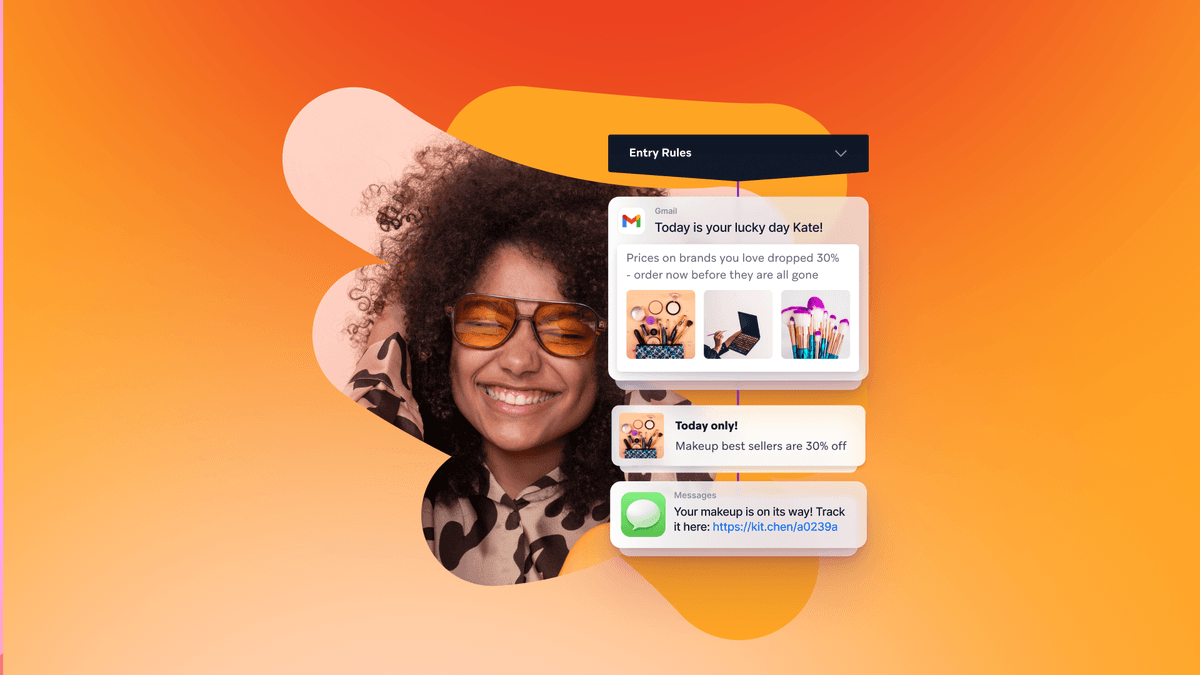

Team Braze
Coordinating marketing at the enterprise level can be a high-complexity operation. Teams are managing campaigns across regions, channels, and customer segments—all while working against timelines and evolving priorities. Automation helps simplify that complexity, equipping marketers with the tools to move faster and respond to customer behavior in real time.
Enterprise marketing automation brings structure and speed to large-scale operations. By connecting systems, syncing data, and powering consistent, personalized experiences, the right platform helps teams execute confidently—whether managing global lifecycle campaigns or adapting journeys by region.
In this guide, we’ll break down how enterprise marketing automation works, what sets it apart from standard tools, and what to look for when choosing a solution that fits the way your organization operates.
Contents:
- What is enterprise marketing automation?
- How does enterprise marketing automation differ from standard tools?
- Scalable marketing automation activities for large organizations
- Benefits of marketing automation for large organizations
- The role of AI in enterprise marketing automation
- How to choose the right enterprise marketing automation software and platform
- Why enterprise teams use Braze
- Final thoughts on enterprise marketing automation
- FAQs about enterprise marketing automation
What is enterprise marketing automation?
Enterprise marketing automation refers to the software and strategies that help large organizations automate customer engagement across channels, regions, and business units. Unlike one-size-fits-all solutions, these platforms can handle complexity, supporting large volumes of customer data, multiple teams, and dynamically personalized customer journeys.
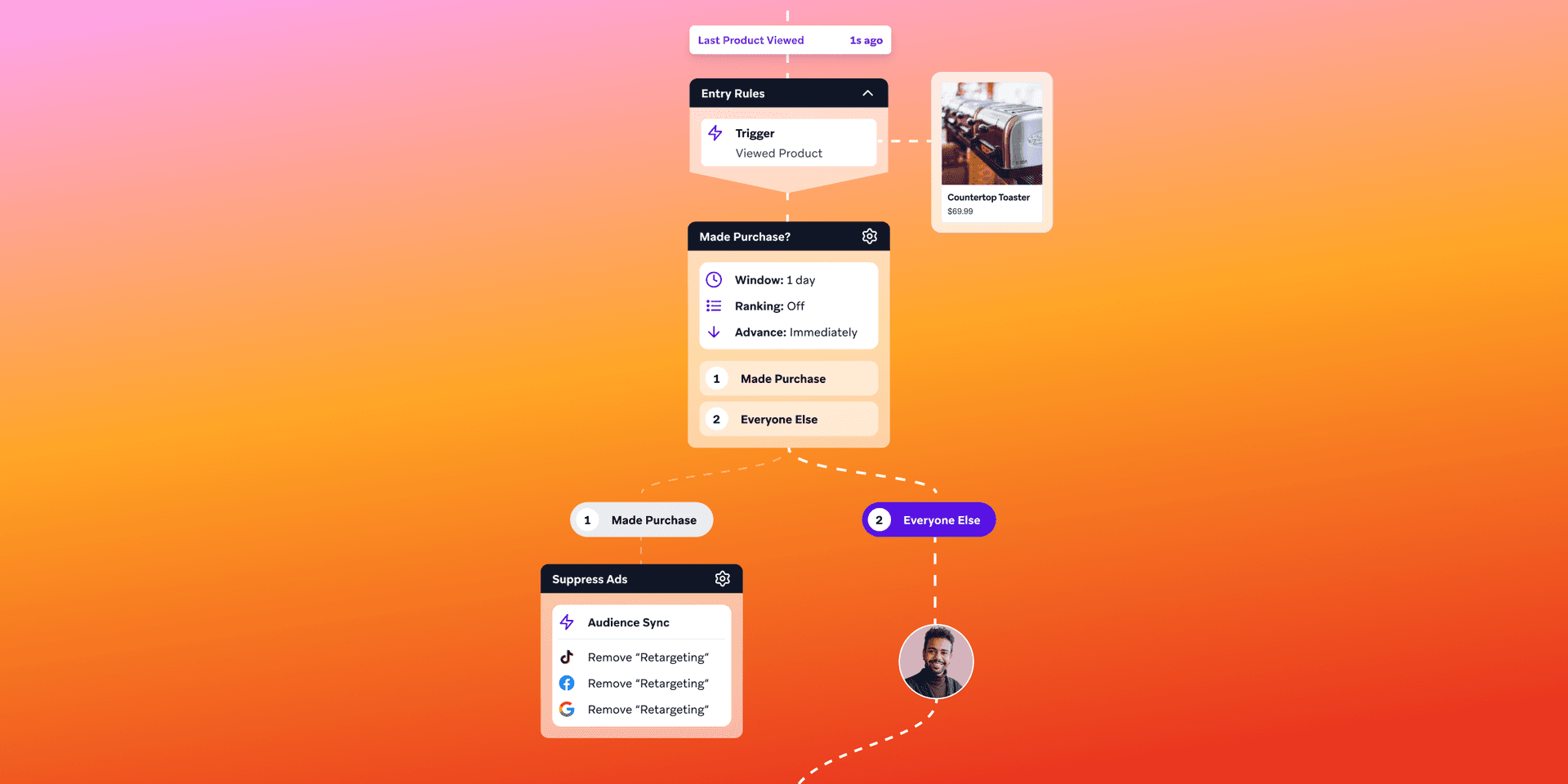
Enterprise marketing automation enables brands to manage high-scale, high-stakes marketing with greater efficiency and control.
Enterprise solutions typically include:
- Cross-channel campaign orchestration (email, SMS, push, in-app, and more)
- Data streaming across CRMs, CDPs, and analytics tools
- Advanced segmentation and dynamic personalization
- AI and predictive capabilities for smarter targeting
- Role-based permissions, audit trails, and governance features
How does enterprise marketing automation differ from standard tools?
Standard marketing automation tools help businesses automate repetitive tasks—think scheduling email campaigns, managing basic customer journeys, or setting up simple lead capture forms. They're great for improving efficiency and freeing up time for more strategic work. Enterprise marketing automation is about taking these concepts but pushing them further, operating at a larger scale for many types of customers.
Enterprise marketing automation supports a different level of complexity—think orchestrating personalized, cross-channel experiences for millions of users, across multiple teams, products, and geographies.
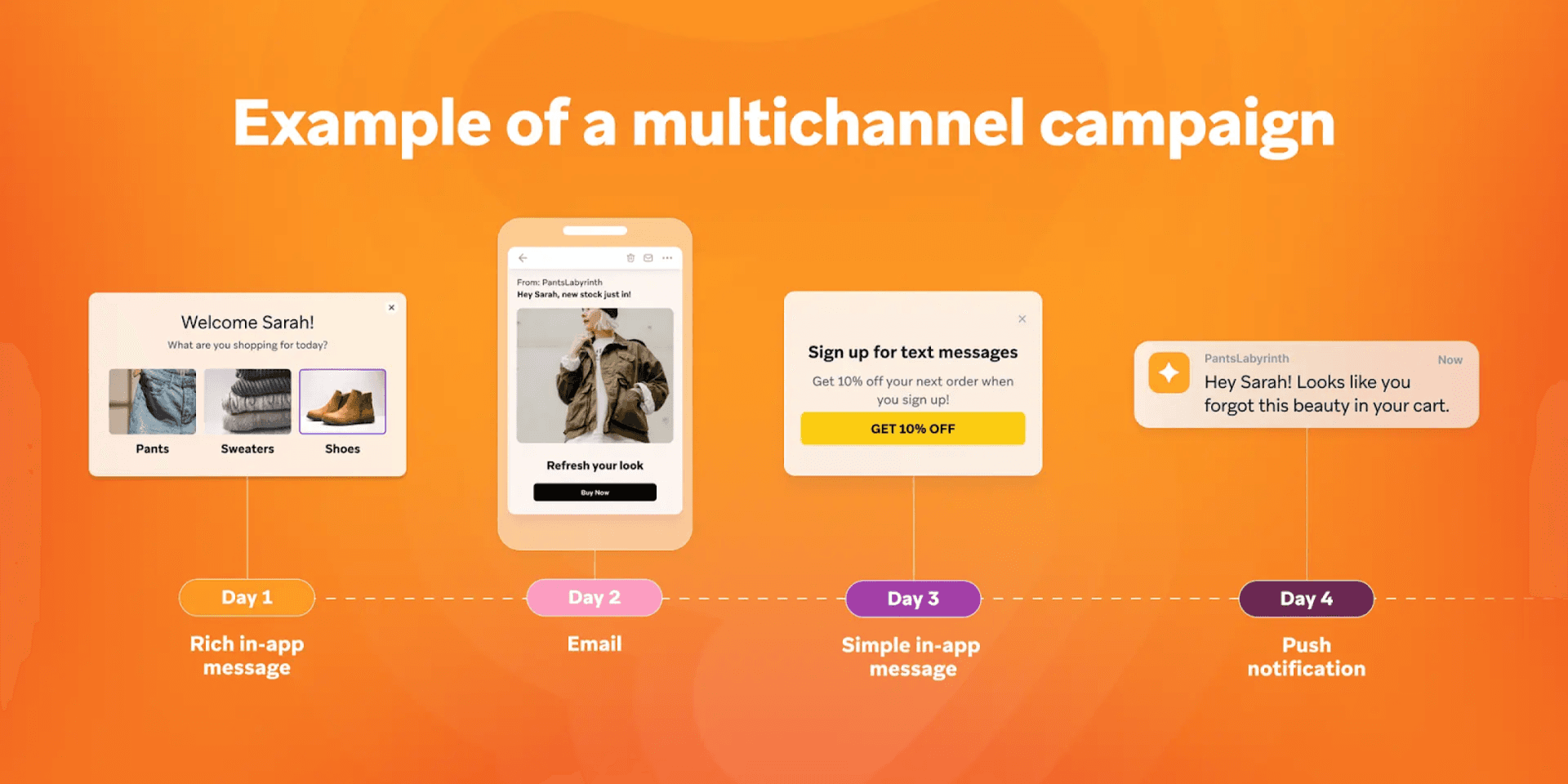
Enterprise platforms should support:
- Scale and performance: Handling large data volumes, concurrent campaigns, and high message throughput without compromising speed or deliverability.
- Cross-functional collaboration: Supporting dozens (or hundreds) of users with role-based access, approval workflows, and centralized governance.
- Advanced integrations: Connecting with enterprise customer relationship management (CRM) platforms, customer data platforms (CDPs), business intelligence (BI) tools, and internal data warehouses.
- Flexible architecture: Adapting to complex structures and evolving business needs—supporting global teams, regional variations, and multiple brands or product lines as each evolve and grow.
Scalable marketing automation activities for large organizations
When you’re running marketing at scale, it’s not enough to automate one-off tasks. Enterprise teams need systems that can adapt in real time, support multiple teams and regions, and respond to customer behavior across every channel.
Here are some of the key marketing activities that enterprise organizations can automate:
Cross-channel campaign orchestration
Coordinate messaging across email, SMS, push notifications, in-app messages, webhooks, and more—triggered by user behavior, preferences, or lifecycle stage. Campaigns can be localized and adapted by region, all within the same workflow.
Lead nurturing and scoring
Automatically identify, prioritize, and move leads through the funnel with dynamic journeys, tailored content, and synced scoring models across your CRM and sales tools.
CRM and CDP syncing
Keep data flowing between your marketing platform, CRM (customer relationship management), and CDP (customer data platform). This enables real-time updates, accurate segmentation, and seamless handoffs between marketing and sales.
Behavioral triggers and lifecycle journeys
Automate journeys based on real-time activity—a cart left behind, a feature used for the first time, or a subscription about to expire. These timely, personalized messages drive action and retention.
Advanced segmentation and personalization
Use real-time, historical, and predictive data to create precise audience segments, then personalize content, offers, and timing based on what matters most to each individual.
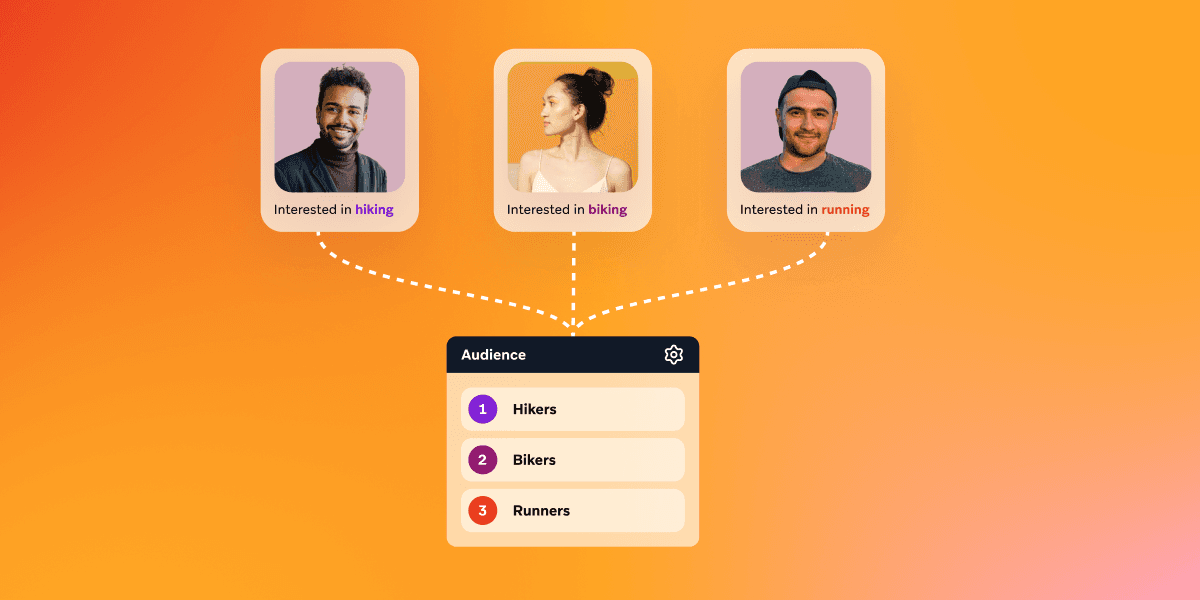
Multi-language and multi-region campaign delivery
Build campaigns that automatically serve localized content based on user preferences, location, or regulatory needs. No manual duplication or version tracking required.
Predictive insights and AI decisioning
Enterprise automation platforms increasingly embed AI to help teams move faster and personalize smarter. Predictive models can identify which users are most likely to churn or convert, triggering the right message at the right time. Tools like Braze Predictive Churn and Predictive Purchases allow teams to take action based on what’s likely to resonate and convert.
Intelligent delivery
AI can also help determine the best moment and method to reach each customer. With Intelligent Channel, messages are delivered via the channel a user is most likely to engage with—whether that’s email, push, or in-app. Combined with send-time optimization, this reduces guesswork and improves engagement.
Benefits of marketing automation for large organizations
Marketing automation gives enterprise teams the structure and flexibility to manage complex campaigns without compromising quality or speed. With the right platform in place, organizations can shift from one-off tactics to coordinated, insight-led customer experiences.
Here are some of the biggest benefits:
1. Efficiency at scale
Automation reduces manual work, speeds up execution, and helps teams launch multi-market, multi-channel campaigns without the usual bottlenecks.
2. More consistent customer experiences
Centralized workflows make it easier to deliver cohesive messaging and design across touchpoints, while still supporting local customization where needed.
3. Greater personalization
Teams can tailor content to individual behaviors, preferences, and timing—using real-time and predictive data to guide messaging that feels relevant and timely.
4. Stronger collaboration between departments
Shared data, automated triggers, and integration with systems like CRM and support tools help align sales, marketing, product, and customer service teams.
5. Better insights, faster
With all your campaign and engagement data in one place, teams can track performance, spot trends, and adapt strategies quickly.
6. Higher ROI
Relevant, well-timed messaging can drive stronger results. Marketing automation helps improve engagement, retention, and customer lifetime value, without increasing overhead.
7. Smarter optimization through AI
AI-powered experimentation learns which content, timing, and channels resonate most for each user, optimizing campaigns continuously. This reduces manual testing and allows teams to focus on strategic decisions while automation handles the fine-tuning.
The role of AI in enterprise marketing automation
AI is reshaping what enterprise marketing automation can do. By embedding machine learning directly into campaign logic, today’s platforms allow marketers to go beyond rule-based triggers and segment-level decisions.
Predictive insights
Predictive models help teams anticipate outcomes like churn, conversion, or repeat purchases—enabling earlier, more relevant interventions.
Adaptive logic and testing
Instead of running A/B and multivariate tests manually, AI-powered experimentation tools can automatically test, learn, and optimize variations in real time. This speeds up performance improvements without added lift.
Channel and timing optimization
AI helps select the right message, channel, and moment for each user, reducing guesswork and improving engagement rates across the board.
Content generation support
Tools like Braze AI Copywriting Assistant help teams speed up message production and adapt language dynamically, without sacrificing brand voice or tone.
As enterprise teams look to automate more intelligently, AI adds a necessary layer of speed and precision.
Journey optimization
Instead of locking customers into predefined paths, agentic AI adapts and personalizes the journey based on individual customer profiles. If someone’s behaviors, motivations, or buying patterns shift, agentic AI can help personalize the experience based on unique customer actions.
Reinforcement learning
Rather than manually launching tests and waiting for results, agentic AI can automatically test multiple variations, learn from outcomes, and push the top-performing version for each individual.
How to choose the right enterprise marketing automation software and platform
Large organizations need scalable systems that can support multi-team collaboration, tech stack integrations, and support as you scale.
Here’s what to consider when evaluating enterprise marketing automation software and platforms:
Scalability
Your platform should handle high message volumes, large datasets, and complex campaign logic without performance issues. Look for tools that can grow with your business and support distributed teams across multiple geographies.
Integrated ecosystem
Enterprise platforms need to connect seamlessly with the rest of your tech stack. Prioritize options with an extensive partner ecosystem and the flexibility to connect to new tools as you grow.
Customization and flexibility
Campaigns shouldn’t be boxed in by rigid templates. Choose a platform with visual builders, reusable components, and dynamic personalization tools—so marketers can adapt quickly without developer input.
Reporting and analytics
Reporting dashboards, attribution models, cohort analysis, and testing tools help enterprise teams make decisions with confidence. Prioritize platforms that connect engagement data directly to business impact.
AI and predictive capabilities
Look for platforms that offer embedded AI features to support audience targeting, copy generation, channel selection, and journey optimization.
Why enterprise teams use Braze
For enterprise marketing teams working across regions and channels, it’s critical to have tools that support orchestration, personalization, and decision-making based on streaming data. Braze offers features like Canvas—our no-code customer journey builder—that allow teams to create, test, and adapt cross-channel campaigns. With an extensive partner ecosystem, Braze can fit into complex tech stacks while helping teams move faster and stay aligned.
Final thoughts on enterprise marketing automation
Enterprise marketing automation plays a critical role in helping large organizations deliver consistent, personalized, and data-driven experiences at scale. It allows teams to move faster, align across regions, and respond to customer behavior in real time—without sacrificing control or flexibility.
While standard tools can automate simple tasks, enterprise platforms are designed to handle complex workflows, cross-functional collaboration, and expanding volume. That makes them essential for businesses looking to unify their customer engagement strategy and drive long-term results.
Choosing the right platform comes down to finding one that fits the way your teams work and the way your customers move. When automation supports both, it becomes a powerful driver of efficiency, insight, and growth.
FAQs about enterprise marketing automation
What is enterprise marketing automation?
Enterprise marketing automation refers to the software and systems that help large organizations automate and personalize customer engagement across channels, teams, and regions. These platforms support high-volume messaging, complex workflows, and real-time decision-making.
Why do large organizations need marketing automation?
Marketing automation helps large organizations operate more efficiently, coordinate across business units, and deliver consistent experiences. It also enables faster testing, personalization at scale, and better alignment between teams.
How is enterprise marketing automation different from standard tools?
Enterprise platforms support greater scale, deeper integrations, and more advanced governance than standard tools. They’re built to manage complex customer journeys, high data volumes, and cross-functional collaboration more so than standard tools.
What are examples of scalable marketing automation?
Scalable marketing automation includes personalized onboarding flows, real-time behavioral triggers, cross-channel lifecycle campaigns, and CRM-integrated lead nurturing that adapts to each region or audience segment.
What are key features of enterprise marketing automation platforms?
Key features of enterprise marketing automation platforms include cross-channel orchestration, advanced segmentation, integration with CRMs and CDPs, real-time analytics, and data governance tools.
How do you choose the right enterprise marketing automation platform?
When choosing an enterprise marketing platform, look for one that can scale with your business, integrate with your tech stack, and support complex workflows. Prioritize flexibility and the ability to action on insights.
How does Braze support enterprise marketing automation?
Braze helps enterprise teams build, automate, and adapt cross-channel campaigns using real-time data, AI-powered personalization, and a visual journey builder called Canvas. It integrates with existing systems and supports marketing at scale.
Be Absolutely Engaging.™
Sign up for regular updates from Braze.
Related Content
 Article13 min read
Article13 min readBraze vs Salesforce: Which customer engagement platform is right for your business?
February 19, 2026 Article18 min read
Article18 min readBraze vs Adobe: Which customer engagement platform is right for your brand?
February 19, 2026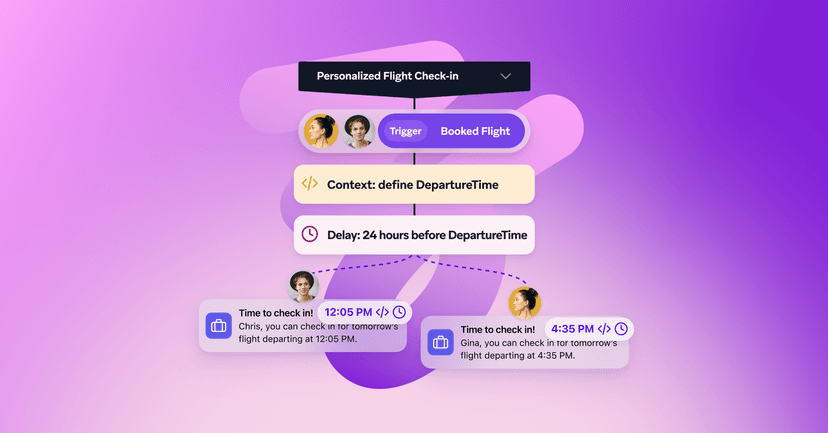 Article7 min read
Article7 min readEvery journey needs the right (Canvas) Context
February 19, 2026